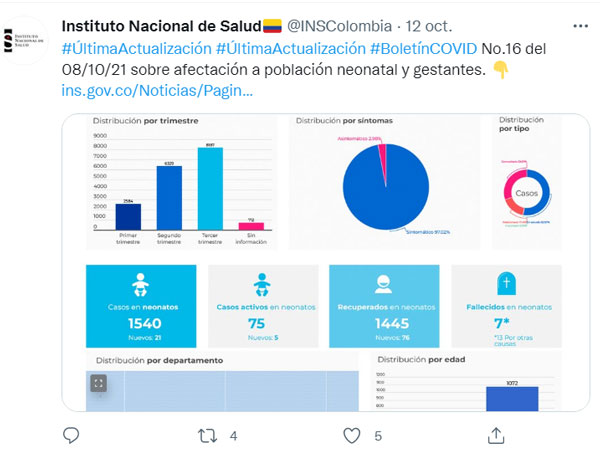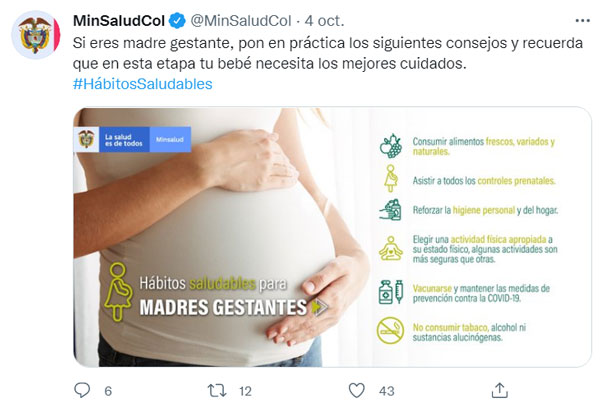Promoting Covid-19 Vaccination of Pregnant Women in Colombia
Since the first cases appeared in early 2020, the COVID-19 pandemic rapidly evolved into a global health catastrophe. Certain groups, for which data were initially unavailable, were at higher risk of the virus. One of these groups was pregnant women.
Recently, the Pan American Health Organization (PAHO) advised that more than 270,000 pregnant women have been infected with COVID-19 in the Americas; more than 2,600 have died from the COVID-19. In Colombia, COVID-19 became the leading cause of maternal death in 2021, according to PAHO. After decades of progress in reducing maternal mortality, these have been drastically undermined by the pandemic. Therefore, it is necessary to join forces to prioritise pregnant and breast-feeding women for vaccination.
Even though the first cases of COVID-19 were reported in Colombia in March 2020, it was not until July 2021 that the National Institute of Food and Drug Surveillance in the country resolved to update the information of the Sanitary Authorization for Emergency Use of the Pfizer-BioNTech COVID-19 Vaccine, to consider its use for pregnant women. This consideration came about due to the gradual development of different vaccines, and the increasing body of evidence on COVID-19 and the vaccine.
An initial study by Chen et al in March 2020 examined118 pregnant women with COVID-19 in Wuhan (Hubei, China). The study did not find a higher risk for this population. Subsequently, systematic reviews, such as the one by Allotey et al. 2020, reported a greater need for intensive care and invasive ventilation for pregnant women with COVID-19.
Deeply concerned about COVID-19 and the new vaccines, patients sought answers not only in doctors' offices, but also on social media. However, the pandemic spurred a wave of misinformation, which was often inaccurate or without any direct scientific support. This came to be known as an ‘infodemic’. The World Health Organization indicated as early as 2020 that this misinformation was extremely harmful and a threat to health systems and health policies.
In this scenario, it was essential for public health authorities to deploy a comprehensive communication strategy. The Communications Group of the Ministry of Health in Colombia published press releases, videos, infographics and many campaigns on the internet and mass media. The main objective was to bring reliable information to the community based on the available evidence, and clarifying why these decisions were made.
Figure 1: Covid-19 health risk communication experience.
Source: Colombian Ministry of Health on YouTube

Figure 2: Infographic on pregnant women and neonates affected by COVID-19.
Source: Colombian National Institute of Health on Twitter @INSColombia

Figure 3: Colombian Ministry of Health on Twitter @MinSaludCol
In Colombia, the National Institute of Health played an important role–– not only in translating information but also in promoting research and epidemiological surveillance. Systematic literature reviews by the National Health Observatory supported Colombian health authorities in its decision-making process and in implementing public health initiatives.
Information on vaccinations for pregnant women was assessed by working groups from the Ministry of Health and Social Protection, with the support of a Maternal and Perinatal Health Committee. Once the information was critically appraised, the Colombian authorities finally prioritised pregnant women for vaccinations. Currently, these patients are prioritised from week 12 and up to 40 days postpartum.
Recently, the Colombian Federation of Obstetrics and Gynecology, together with the Ministry of Health and Social Protection, issued a warning to the general public that COVID-19 had become the first cause of maternal mortality in the country. Because of that, it was so important for pregnant women be vaccinated.
Meanwhile, the fight against the infodemic in Colombia, especially in social media, continues.
Links to additional resources
PAHO News (September 2021). Available at: https://www.paho.org/en/news/8-9-2021-paho-director-urges-countries-prioritize-pregnant-and-lactating-women-covid-19
Rozo N, Valencia D, Newton SM, Avila G, Gonzalez MA, Sancken CL, et al. Severity of illness by pregnancy status among laboratory-confirmed SARS-CoV-2 infections occurring in reproductive-aged women in Colombia. Paediatr Perinat Epidemiol. 2021. doi: http://dx.doi.org/10.1111/ppe.12808 Epub ahead of print. PMID: 34467554.
Chen L, Li Q, Zheng D, Jiang H, Wei Y, Zou L, et al. Clinical Characteristics of Pregnant Women with Covid-19 in Wuhan, China. N Engl J Med. 2020;382:e100.
doi: http://dx.doi.org/10.1056/NEJMc2009226
Allotey J, Stallings E, Bonet M, Yap M, Chatterjee S, Kew T, et al. Clinical manifestations, risk factors, and maternal and perinatal outcomes of coronavirus disease 2019 in pregnancy: living systematic review and meta-analysis. BMJ (Clinical research ed). 2020;370:m3320. doi: http://dx.doi.org/10.1136/bmj.m3320
Instituto de Evaluación Tecnológica en Salud (Institute of Technological Evaluation in Health). Colombia. https://www.iets.org.co/.
Instituto Nacional de Salud (Colombian National Institute of Health). https://www.ins.gov.co.
Instituto Nacional de Salud. COVID-19 en Colombia. Consecuencias de una pandemia en desarrollo. https://www.ins.gov.co/Direcciones/ONS/Informes/12COVID-19%20en%20Colombia,%20pandemia%20en%20desarrollo.pdf.
World Health Organization. Managing the COVID-19 infodemic: Promoting healthy behaviors and mitigating the harm from misinformation and disinformation. https://www.who.int/news/item/23-09-2020-managing-the-covid-19-infodemic-promoting-healthy-behaviours-and-mitigating-the-harm-from-misinformation-and-disinformation.
Ministerio de Salud y Protección Social. Centro de Comunicaciones. Boletín de Prensa No 892 de 2021. (Ministry of Health and Social Protection. Communication Center. Press Bulletin No 892 of 2021). https://www.minsalud.gov.co/Paginas/Minsalud-y-Fecolsog,-juntos-en-la-prevenci%C3%B3n-de-mortalidad-materna-.aspx
Author
Carla Lorena Macchia de Sánchez 1
1 Programa de Medicina. Facultad de Ciencias de la Salud. Universidad del Magdalena, Santa Marta, Colombia.
Disclaimer
The views expressed in this World EBHC Day Blog, as well as any errors or omissions, are the sole responsibility of the author and do not represent the views of the World EBHC Day Steering Committee, Official Partners or Sponsors; nor does it imply endorsement by the aforementioned parties.

